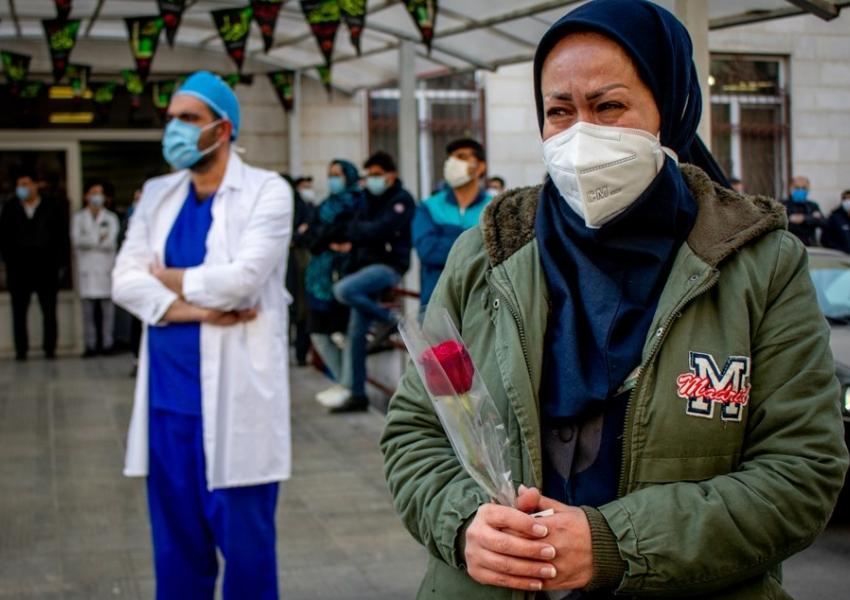
'British' Covid Variant Spreading Fast In Iran, While Vaccination Is Far Off
Alireza Zali, Chief of Operation of Tehran Coronavirus Combat Taskforce, on Saturday said the so-called British mutant of the coronavirus is now circulating among the population of 28 out of 31 Iranian provinces. He warned of an increased risk of the mutant's further spread in the country in late March if people take trips during the upcoming New Year holidays.
"We are definitely facing the bitter scenario of the circulation of the mutant virus across the country," Zali told reporters.
According to Dr. Alireza Raeesi, Spokesman of the National Coronavirus Combat Taskforce, two provinces, namely Tehran and the southwestern province of Khuzestan, have been most impacted by the mutant but West Azarbaijan and Central provinces also have a high parentage of covid-19 cases resulting from the new strain.
Speaking to reporters after a meeting of the Taskforce attended by President Hassan Rouhani Saturday evening, Raeesi said the number of cities coded "red" has increased from eleven to fourteen, including 13 in Khuzestan province.
The government of President Hassan Rouhani has been struggling with the pandemic and tough US sanctions simultaneously. Deputy Health Minister Iraj Harirchi on Saturday said the government cannot afford to tell people to stay home and self-isolate because it does not have the resources to pay them to stay home and not spread the virus. According to Harirchi, in 70 percent of the cases where self-isolation was required, people had had to leave their homes for work or shopping. Those who have an income of under 20 million rials ($800) a month do their shopping on a daily basis. "They don't dare to do their shopping fortnightly," Harirchi said.
Iran began vaccinations on February 9 with the Russian-made Sputnik V. According to Raeesi, Iran has so far received 410,000 doses of Sputnik V, 250,000 doses of the Chinese Sinopharm, 125,000 doses of BBV152 (also known as Covaxin) made by India's Bharat Biotech, and 100,000 doses of the Cuban Soberana-02 vaccines. He said a further 375,000 doses of BBV152 is due to arrive on Monday. One million Iranians are to receive the vaccine before the New Year holidays start on March 21, he said. That constitutes a tiny percentage of the population, compared with some other regional countries that have vaccinated a significant larger percentage.
Sourcing the Covid vaccine has become a highly politicized in Iran. The country has so far not imported any US or UK-made covid vaccines banned in early January by Supreme Leader Ali Khamenei, alleging that western countries and pharmaceutical companies may be seeking to test their products on other nations. He strongly supports development of covid vaccines at home, but that can take months before mass production.
Conspiracy theories about western vaccines have been aired extensively by Iranian hardliners but Khamenei’s apparent endorsement of such theories has caused deep concern among Iranians hoping for the arrival of the US-made Pfizer and Modena and Britain’s Oxford vaccines.
Public Relations Head of the Health Ministry Dr. Kianoush Jahanpur on Thursday tweeted the Cuban vaccine due to arrive in Tehran on the same day was intended for use in three multi-centric human studies. He said elsewhere that Soberana-02 which has been developed jointly by Cuba's Finlay Institute and Iran's Pasteur Institute will be clinically tested in both countries simultaneously. In another tweet on March 12, Jahanpur said at least fourteen Iranian institutes and companies are working on various types of coronavirus vaccines and claimed that one, developed by Milad Daru Nour pharmaceutical company will enter the clinical trial stage soon.
Iran has reported 1.72 million Covid cases and 61,000 deaths, according to government data released on Sunday, with 88 deaths in the previous 24-hour reporting period. According to Dr Sima-Sadat Lari, the health ministry spokesperson, nearly 11.52 million coronavirus tests have been carried out.









